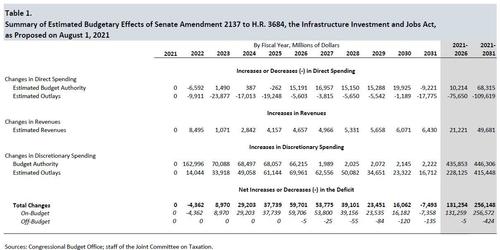CBO Sees Infrastructure Bill Adding $250 Billion To Deficit Over 10 Years
The Congressional Budget Office (CBO) on Thursday released its analysis of the $1 trillion bipartisan infrastructure package, estimating that it will add $256 billion to the federal deficit over the next decade, a tall hurdle for GOP senators who have insisted on paying for the entire cost of the legislation.
The budget office projects estimates the bill would increase discretionary spending by $415 billion over 10 years while increasing revenues by $50 billion and decreasing direct spending by $110 billion. “On net, the legislation would add $256 billion to projected deficits over that period,” CBO reported in its summary.
The bipartisan group of senators who negotiated the bill with the White House says it would spend $550 billion in new money over the current budget baseline. That means that less than half of the new spending would be offset by pay-fors, according to CBO's stringent standards for scoring legislation.
The reason why this latest bean count matters is because many Republicans have said for weeks that they wanted to see an official analysis showing the $1 trillion infrastructure bill is being “credibly” paid for.
“We need to get a score, so we need to see whether the proposal is credibly paid for,” Senate Minority Leader Mitch McConnell (R-Ky.) said in late June, when he said he was undecided over whether to support the legislation.
McConnell was one of 17 Republicans who voted last week to proceed to the bill, though that doesn’t necessarily mean he’ll support final passage. The CBO score backs up conservative Republicans who criticized some of the bill’s pay-fors - such as $28 billion from taxing cryptocurrencies - as budget gimmicks.
“It’s easy to get so wrapped up in it and so wrapped up with the things that you see in the bill that are good … sometimes when you get so wrapped up in that, it’s easy to lose sight of the fact that the pay-fors are fake,” said Republican Senator Mike Lee.
“As much as half of the pay-fors are just fake,” he added.
CBO’s projection comes as a disappointment to fiscal hawks in Congress but not as a big surprise.
The lead authors of the legislation, including Sen, Rob Portman had already acknowledged to colleagues that the budget office had signaled it would assess the various pay-fors in the legislation as covering only part of the bill’s overall cost. Portman’s staff has worked for weeks to give other Senate Republican offices advanced notice that the CBO would rate the pay-fors as only partially covering the cost of the bill. But Portman and his staff have also pointed to additional materials, such as CBO estimates that aren’t included in the official score, that indicate the real-world budgetary impact of the infrastructure bill won’t add as much to the deficit as the official score projects.
The effort may be paying off because as the Hill reports, senators don’t expect a significant drop-off in support now that the CBO score has been officially released. Several Republican swing votes have already said they don’t have a problem with a cost analysis showing that $550 billion in new spending is not fully offset.
“The Congressional Budget Office has long been hamstrung by rules that make them always wrong. They’ve never been exactly right,” said Sen. Todd Young (R-Ind.) on Monday. “There’s real-world score-keeping, as my constituents understand, like when you claw back unused COVID money or use other unspent government monies.
Of course, it usually goes the other way and most spending bills end up adding far more than the CBO had initially projected, but that's a topic for another post. And clearly not Republican senators are on board.
Infrastructure is being used as a Trojan horse for the left’s massive socialist agenda. https://t.co/KH8ozu0pcl
— Sen. Marsha Blackburn (@MarshaBlackburn) August 5, 2021
“The Congressional Budget Office doesn’t give credit for that and instead counts that as a whole in the spending,” he added. “My constituents are smart enough to understand that that’s an artificial score. So I’m not troubled by it. I dive into the particulars and look at the real-world accounting, as opposed to Washington, DC, CBO accounting.”
The budget score came shortly after the CBO released its updated budget projection of a $3 trillion federal deficit for 2021. It also projected an average annual deficit of $1.2 trillion for years 2022 to 2031.
https://ift.tt/3jpouRX
from ZeroHedge News https://ift.tt/3jpouRX
via IFTTT


0 comments
Post a Comment